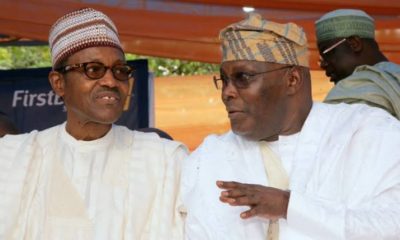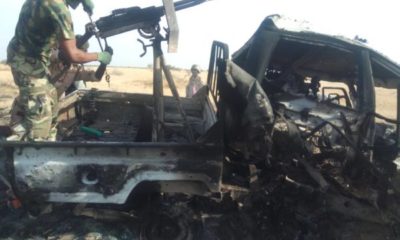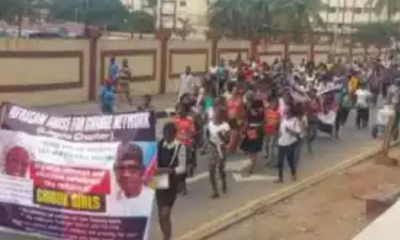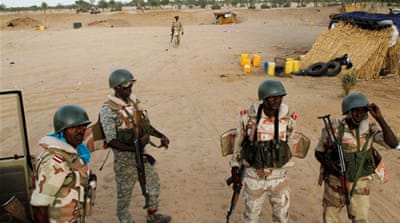Nigeria News
Boko Haram: The Amnesty Debate
The clamour for amnesty for Boko Haram members as a solution to the insurgency ravaging the North delivers its first fruit with the establishment of a committee to work out modalities for the process

•Jonathan: weighing the amnesty option
Last Wednesday, President Goodluck Jonathan met with a group northern elders. The major topic of discussion at the meeting, which lasted late into the night, was the relentless insurgency that has rendered the North a playground of murderous impulses. The leaders, led by Alhaji Maitama Sule, came under the auspices of the Northern Elders Forum, NEF.
The focus was how to end the debilitating insurgency by members of the Jama’atu Ahlis Sunnah Lid Da’awati wal Jihad, also known as Boko Haram. Prior to meeting the President, there were indications that the northern elders, who have been clamouring for declaration of amnesty as a means of ending Boko Haram insurgency, met at a hotel in Abuja, where they resolved to again put the request before the President. On the other hand, Jonathan and his aides had consistently dismissed amnesty as a way out of the insurgency with the argument that the sect is faceless.
But at the time of filing this report, there were hints that the elders succeeded in selling amnesty to the President at the meeting. “On amnesty, what we discussed is that the general opinion in the country is that amnesty should be worked into whatever the government is trying to do to overcome the violence that is taking place all over the country, particularly in the Northern part of Nigeria. Fortunately, the President is thinking hard on it and he assured us that there is a special meeting on the matter tomorrow,” said Professor Ango Abdullahi, spokesman for the NEF.
Very late last Thursday, it was gathered, the President agreed to establish an amnesty commission with the setting up of a committee within the membership of the National Security Council, NSC, to work out the modalities.
Though the identities of the committee members were unknown at press time, it was learnt that they will work closely with the Office of the National Security Adviser.
As this magazine learnt last week, the terms of reference of the committee are: i) to consider the feasibility or otherwise of granting pardon to the Boko Haram adherents (ii) collate clamours arising from different interest groups who want the apex government to administer clemency on members of the religious sect and (iii) to recommend modalities for the granting of the pardon should such step become the logical one to take under the prevailing circumstances.
The committee is expected to submit its report to the President when the NSC meets in a fortnight.

•Yusuf Maitama Sule… leading northern leaders’ amnesty charge
The establishment of the committee will be enthusiastically received by the northern elders, who have remained resolute in their demand for amnesty. Indeed, the same group of elders had visited the Emir of Kano, Alhaji Ado Bayero, about two weeks ago, during which they also asked government to grant amnesty to members of Boko Haram even as they pointed out that a report they submitted to Jonathan on how to end the crisis has been ignored. Professor Abdullahi told journalists after the visit to the Emir that key among the recommendations in their report to Jonathan was dialogue with Boko Haram.
Alhaji Mohammed Sa’ad Abubakar, the Sultan of Sokoto, kicked off the campaign for amnesty as a means ending the insurgency during a meeting of the Central Council of Jama’atu Nasril Islam in Kaduna early last March. This was about the time the President was planning to visit Yobe and Borno states, headquarters of the fundamentalist sect. While decrying the state of insecurity across the country, the Sultan had emphasised that it is the duty of the government to protect every citizen. The Sultan then made allusion to the then impending visit of the President and what should happen at the occasion. “We want to use this opportunity to call on the government, especially Mr. President, to see how he can declare total amnesty for all combatants without thinking twice. That will make any other person who picks up arms to be termed as a criminal. If the amnesty is declared, majority of those young men running would come out and embrace that amnesty and some of them have already come out because we have read some of the stories in the newspapers,” said the Sultan.
But the suggestion, which had been bandied by some Northern leaders, who likened the Boko Haram insurgency to the militancy in the Niger Delta, was met with immediate disapproval from aides of the President. There were also strident opposition to the idea, especially from those in the southern part of the country and religious groups. “The Sultan’s call is obviously an indication that the caliphate is encouraging and condoning bloody violence. Our position in Afenifere is that the Boko Haram members are evil. They should be identified and severely dealt with according to the laws of the land,” said Reuben Fasoranti, a leader of Afenifere, the influential Yoruba socio-political group. Musa Asake, General Secretary of Christian Association of Nigeria, who described Boko Haram members as a “bunch of fundamentalists who have killed, maimed, deformed Christians” said the group must first put an end to its activities before amnesty can be discussed.
Manaidi Dagogo-Jack, Rivers State Chairman of the Conference of Nigeria Political Parties, CNPP, also opposed to the Sultan’s call.
“The President would be setting a very bad precedent if he accepts to grant a faceless Boko Haram amnesty. We respect the Sultan’s opinion, but the government should ask him to identify who they are before talking about amnesty,” he said.
But the Sultan has not been without supporters. Abubakar Tsav, a former Commissioner of Police, said the visit of the President to Borno State can only be meaningful if he declares amnesty for the insurgents. But during the visit to Borno and Yobe States, the President did not mince words on whose side of the argument he was on.
Speaking at a town hall meeting in Maiduguri, Jonathan dismissed the comparison of Boko Haram insurgency to the militancy in the Niger Delta before the declaration of amnesty for militants. He cited the invisibility of Boko Haram leaders and the vagueness of their demands as reasons for government’s rejection of the demand that they be amnestied. “What I am saying is that in the Niger Delta case, if you call them, they will come and tell you their grievances, right or wrong. They will be there to tell you ‘this is what we want, this is why we are doing this’. But in the case of the Boko Haram, you don’t see anybody who will say he is a Boko Haram member, so we cannot declare amnesty. For us to declare amnesty, we must be communicating with people. We cannot declare amnesty for people that are operating under a veil,” reasoned Jonathan.
The President’s position did not sit well with the Borno Elders Forum, a group of leaders in the trouble-riven state. Professor Nur Alkali, a prominent member of the group, told journalists that the minimum expectation of the people of the state is amnesty. “There is no alternative to dialogue. And since they talked about peace, we should work towards it, though it may take some time to achieve. The use of violence brings more violence. The minimum expectation is pardon, rehabilitation. Mr. President is expected to announce this before leaving Borno,” Alkali said in hope.

•Ango Abdullahi Abdullahi… wants dialogue with Boko Haram
Apart from dashing this hope, the President also rejected the call by the group for the withdrawal of soldiers from the state. The soldiers have been serially accused of carrying out extra-judicial killings. In rejecting the call, Jonathan challenged the elders to sign an undertaking to guarantee peace and security and to be held accountable for any breach of security if soldiers were withdrawn.
Opponents and supporters of amnesty have hardened their position since the President’s visit. In the opinion of most Northerners, amnesty for Boko Haram members, just like in the case of Niger Delta, will bring the insurgency that has so far claimed over 3000 lives to a conclusive end. And they have also countered the view that members of the sect are faceless with the argument that the frequent claims of arrests of commanders of Boko Haram by agencies is evidence that they are known. Governor Kashim Shettima of Borno State has also argued that it is the task of officials of government to seek out leaders of Boko Haram group just like it happened in the case of leaders of Niger Delta militant groups during the administration of late President Umaru Yar’Adua.
On the other hand, opponents of amnesty have insisted that doing so would amount grave injustice to the victims and their dependants. They also pointed out that the insurgent group has never, on its own, demanded for amnesty or given reasonable grounds on which it will end its deadly campaign. For instance, the group, in video postings by its leader, Abubakar Shekau, affirmed that its aim is to impose total Islamic rule at least across the northern part of the country. Shekau has also severally disowned a faction of the group that has consistently claimed to be interested in dialogue with the Borno State government.
Boko Haram has also made the staggeringly impudent demand that the President convert to Islam. This is in addition to calls for unconditional release of its members currently in detention or undergoing trials over their involvement in various terrorist activities.
Even then, it is not all Northerners that are for the amnesty or all southerners that are against it. Sheik Ahmad Gumi, a prominent cleric, is one of the few northern religious leaders that have refused to buy into the amnesty argument. While lamenting that many innocent people have been killed, maimed, tortured by soldiers in the guise of fighting Boko Haram, Gumi said government should go all out to crush the group. He noted that Boko Haram sect has its own hypocritical interpretation of the Qur’an or Hadith and fatwa. “They have their own interpretation, anything short of that is part of the enemy that should be killed. So on what basis should there be dialogue or amnesty? It is a creed that must be crushed; it is a creed the Prophet – alaihis Salam–wished he was alive to exterminate,” said Gumi.
During a recent visit to Kano State, Asiwaju Bola Ahmed Tinubu, former governor of Lagos State, supported the call for amnesty, but argued that it should only be for members of the sect who “have no blood on their hands,” a condition widely considered unattainable.
Yet, at the end of its meeting about two weeks ago, Northern Traditional Rulers Council had urged the Federal Government to reconsider its stand on amnesty to Boko Haram members. In a resolution issued after the meeting held at the palace of the Sultan by the coordinating secretary of the council and Emir of Kazaure, Alhaji Najib Hussaini Adamu, the council called for decisive action from the federal government to curb the “unfortunate escalation of insecurity in the country.”
“To this end, the federal government is called upon to reconsider its stand and offer amnesty to the insurgents, who embrace the path of peace, reformation and reintegration with the larger society. This is the norm the world over and there exists a precedent in Nigeria,” said the traditional rulers.
It was believed that the persistence of the northern leaders on the issue of amnesty put the Presidency under tremendous pressure, forcing it to modify its opinion on the issue. With such pressure on the President, who is desperate to be in good terms with every significant on account of his second term ambition, analysts had predicted the Presidency would succumb to the amnesty demand. Reuben Abati, spokesperson to the President, had told journalists that it would be “wrong and mischievous” for anybody or group to see the Boko Haram menace and the call for amnesty as issues between the North and the South. “The concern of government is to ensure peace and security in all parts of the country, not regional or ethnic matter,” he said while further clarifying the presidential position on the matter: “In saying that he can’t grant amnesty to ghosts, the President made it clear that if members of the sect come forward to lay down their arms and list their grievances, government will listen to them.” Doyin Okupe, Senior Special Assistant to the President on Public Affairs, had also challenged northern leaders to lead the amnesty effort by coming forward with information on Boko Haram leaders. It was gathered that it was on account of this that the Presidency invited members of NEF to last week’s meeting.
But the question is: Will the members of Boko Haram and equally deadly cousins, Ansaru, be convinced to end violence and embrace amnesty?
—Ayorinde Oluokun/Abuja
——————————————————————————————————————————————-
Posted in Nigeria News. A DisNaija.Com network.
Source: PM News
DisNaija.Com publishes regular posts on Nigeria News, Nigerian Newspapers, Online Nigeria Gist.
Follow us on Twitter and Facebook.
Your Opinion Counts. Be sure To Leave A Comment, If You Have Any.
Please Like, Share or Tweet. Your Support Is Appreciated.

Nigeria News
Kano Transfers Over 1,000 Almajiris To Different States Amidst COVID-19 Pandemic

The Kano State Government on Saturday said it has transferred 1,098 ‘almajiris’ to different states of the country.
The commissioner for local government, Murtala Garo, disclosed this while presenting a report before the state’s task force on COVID-19 at the government house, Kano.
Almajiris are children who are supposed to be learning Islamic studies while living with their Islamic teachers. Majority of them, however, end up begging on the streets of Northern Nigeria. They constitute a large number of Nigeria’s over 10 million out-of-school children.
Mr Garo said the Kano government transported 419 almajiris to Katsina, 524 to Jigawa and 155 to Kaduna. He said all of them tested negative for coronavirus before leaving the Kano State.
Despite the coronavirus test done in Kano for the almajiris, the Jigawa government earlier said it would quarantine for two weeks all the almajiris that recently arrived from Kano.
Mr Garo said another 100 almajiris scheduled to be taken to Bauchi State also tested negative to COVID-19.
In a remark, Governor Abdullahi Ganduje said the COVID-19 situation in Kano was getting worse. He appealed for a collaborative effort to curtail the spread of the virus in the state.
Mr Ganduje, who commended residents for complying with the lockdown imposed in the state, said the decision was taken to halt the spread of the virus.
Kano State, as of Saturday night, has 77 coronavirus cases, according to the Nigeria Centre for Disease Control.
The decision to transfer the Kano almajiris is part of the agreement reached between Northern governors that almajiris in each state be transferred to their states of origin.
However, even before the latest agreement by the governors, the Kano government had been transferring almajiris to other states and neighbouring countries after it banned street begging in the state, most populous in Northern Nigeria.
Despite the transfers, however, no concrete step has been taken to ensure such children do not return to Kano streets as there is freedom of movement across Nigeria although interstate travel was recently banned to check the spread of the coronavirus.
Sourced From: Premium Times Nigeria
Nigeria News
COVID-19: ‘Bakassi Boys’ Foil Attempt To Smuggle 24 Women Into Abia In Container

By Ugochukwu Alaribe
Operatives of the Abia State Vigilante Service, AVS, popularly known as ‘Bakassi Boys’ have arrested 24 market women hidden in a container truck, at Ekwereazu Ngwa, the boundary community between Abia and Akwa Ibom states.
The market women, said to be from Akwa Ibom State, were on their way to Aba, when they were arrested with the truck driver and two of his conductors for violating the lockdown order by the state government.
Driver of the truck, Moses Asuquo, claimed he was going to Aba to purchase stock fish, but decided to assist the market women, because they were stranded.
A vigilante source told Sunday Vanguard that the vehicle was impounded while the market women were sent back to Akwa Ibom State.
Commissioner for Home Land Security, Prince Dan Okoli, who confirmed the incident, said that smuggling of people into the state poses great threat to the state government’s efforts to contain the spread of COVID- 19.
Sourced From: Vanguard News
Nigeria News
Woman Kills Her Maid Over Salary Request

Operatives of the State Criminal Investigation and Intelligence Department (SCIID), Yaba of the Lagos State police command have arrested one Mrs Nene Steve for allegedly killing her maid, Joy Adole
The maid was allegedly beaten to death by Nene for requesting for her salary at their residence located at 18, Ogundola Street, Bariga area in Lagos.
Narrating the incident, Philips Ejeh, an elder brother to the deceased said that he was sad when they informed him that his sister was beaten to death.
He explained that the deceased was an indigene of Benue State brought to Lagos through an agent and started working with her as a maid in January 2020.
‘’She reported that her boss refused to pay her and anytime she asked for her salary she will start beating her.
She was making an attempt to leave the place but due to the total lockdown she remained there until Sunday when her boss said she caught her stealing noodles and this led to her serious beating and death,’’ Ejeh said.
He called on Lagos State Government and well- meaning people in the country to help them in getting justice for the victim.
The police spokesman, Bala Elkana, stated that the woman and her husband came to Bariga Police Station to a report that their house girl had committed suicide.
Detectives were said to have visited the house and suspected foul play with the position of the rope and bruises all over the body which confirmed that the girl had been tortured to death and the boss decided to hang up the girl to make it look like suicide.
He said: “The police moved on with their investigation and found a lot of sign of violence on her body that she has been tortured before a rope was put on her neck.’’
He added that the police removed the corpse and deposited it in the mortuary for autopsy to further ascertain the cause of the death.
Elkana said the matter has been transferred from Bariga police station to Panti for further investigation while the couple have been arrested and will be charged to court.
Tribune
Boko Haram Attacks: Buhari Summons Urgent Meeting Of Service Chiefs

Ostensibly alarmed by the latest killings of dozens of soldiers by Boko Haram insurgents, President Muhammadu Buhari has summoned an urgent meeting of Service Chiefs to find ways to stop the trend.
He has also dispatched the Minister of Defence, Mansur Dan Ali, to the neighbouring Republic of Chad for an urgent meeting with President Idris Deby and his defence counterpart.
Knowledgeable sources said in Abuja on Friday that the president is worried by on the deterioration of security situation on the Nigeria – Chad Border that has led to the recently increased Boko Haram terrorism in the area.
The sources which did not want to be named in Abuja said: “Nigeria has a Chad problem in the Multi-National Joint Task Force (MNJTF) put together to secure the Lake Chad basin areas and repeal the Boko Haram terrorist attacks against all the countries neighbouring the Lake.”
The sources noted that Chad is believed to be having their own internal security challenges and this has reportedly led to their pulling away their own troops manning their own border around Lake Chad, saying: “That lacuna is being exploited by the Boko Haram terrorists, who go in and out of Nigeria, Niger and Cameroon to launch terrorist acts. This is a clear illustration of the fact that terrorism is beyond national borders.”
When contacted, the Senior Special Assistant to the President on Media and Publicity, Garba Shehu, confirmed that the Defence Minister is going to Chad but said he is unaware of the purpose.
Meanwhile, the military authorities are said to be in the process of identifying the families of the latest victims with a view to making contact with them.
Credible sources revealed that it is the reason the president is yet to make any pronouncement on the matter.
“The President has called an urgent meeting with the Service Chiefs, as well as the fact that families of the latest victims of the Boko Haram are being identified and contacts made before a government pronouncement on the tragic attacks. This, it is understood, is the reason for the silence of the government over the incident,” the source said.
Sourced From: Tribune
























